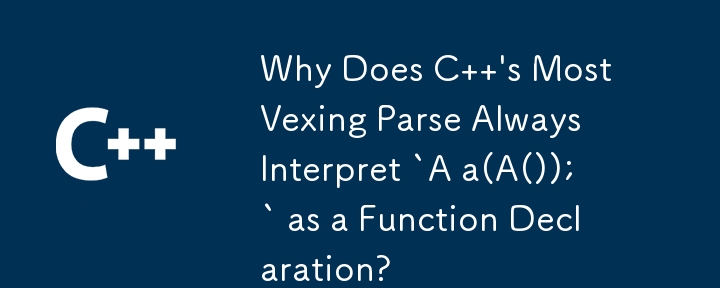

Understanding the Most Vexing Parse Anomaly
In C , the controversial Most Vexing Parse (MVP) rule dictates that a specific syntax ambiguity is always interpreted as a function declaration, despite the majority of programmers expecting otherwise. This anomaly arises from the following syntax:
A a( A() );
Ambiguity Resolution
This code can be parsed in two ways:
According to the MVP rule, the code must be interpreted as the second option, despite most programmers expecting the first.
Rationale for the Standard
The MVP rule was introduced to maintain consistency in C semantics. Without it, the same syntax could be interpreted as either a variable definition or a function declaration, depending on the context. This would have introduced ambiguity and reduced code readability.
Consider the following example:
A foo;
This line is clearly a variable definition. However, if MVP did not exist, the following line would be ambiguous:
A foo();
It could be interpreted as either a variable definition with an empty parenthesis or a function declaration. By enforcing the MVP rule, this ambiguity is eliminated.
Conclusion
The MVP rule enforces consistency in C syntax by always interpreting ambiguous code as a function declaration. While this choice may seem counterintuitive to some programmers, it provides a clear and unambiguous parsing mechanism, reducing the potential for errors and improving code readability.
The above is the detailed content of Why Does C 's Most Vexing Parse Always Interpret `A a(A());` as a Function Declaration?. For more information, please follow other related articles on the PHP Chinese website!
 How to install printer driver in linux
How to install printer driver in linux
 Detailed explanation of Symbol class in JS
Detailed explanation of Symbol class in JS
 How to view Tomcat source code
How to view Tomcat source code
 The difference between vscode and vs
The difference between vscode and vs
 My computer can't open it by double-clicking it.
My computer can't open it by double-clicking it.
 What software is ae
What software is ae
 How to restart the service in swoole framework
How to restart the service in swoole framework
 How to intercept harassing calls
How to intercept harassing calls
 Introduction to the difference between javascript and java
Introduction to the difference between javascript and java




